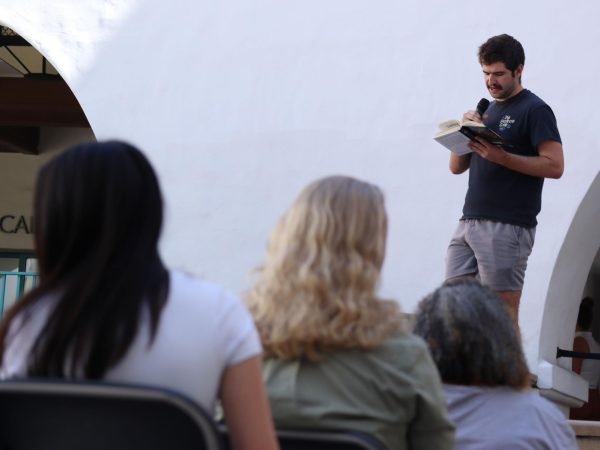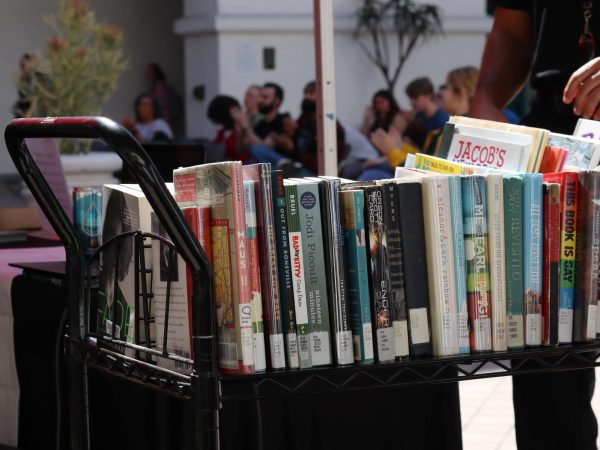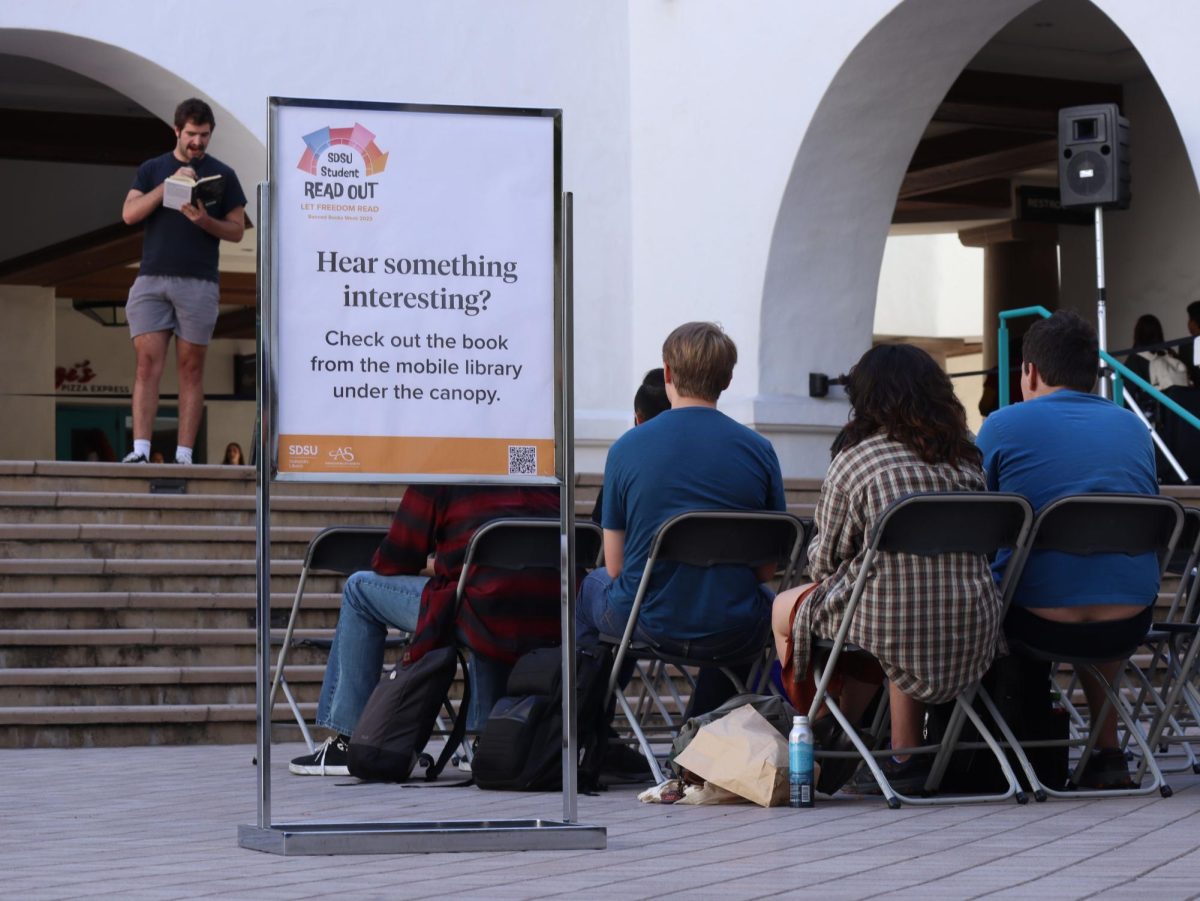Within Aldous Huxley’s “Brave New World,” a striking sentiment emerges from Chapter 17: “But I don’t want comfort. I want God, I want poetry, I want real danger, I want freedom, I want goodness. I want sin.”
It’s an evocative plea to favor the human experience over a controlled, sanitized and regulated existence.
During the sunlit “SDSU Student Read Out: Let Freedom Read” event on Oct. 4, celebrating Banned Books Week 2023, Huxley’s words reverberated.
San Diego State students and faculty gathered at the Conrad Prebys Aztec Student Union Courtyard, not just to read, but to rally against censorship and celebrate the freedom to read.

Ally Gallant, Associated Students’ vice president of university affairs, spoke about concerns over academic censorship, notably of LGBTQ+ and race-related books. Gallant, however, highlighted SDSU’s role in championing academic freedom.
“It’s about the continuous pursuit of knowledge, encountering new ideas and fostering lifelong learning,” Gallant said.
Scott Walter, a library dean at SDSU, took to the stage to emphasize the California State University’s commitment to foundational freedoms. According to Walter, these freedoms are essential for the university’s mission and California’s informed citizenry. He also acknowledged the library staff, while spotlighting the available challenged books for immediate checkout.
Walter then shared a passage from Maia Kobabe’s “Gender Queer: A Memoir” which read, “Some people are born in the mountains, while others are born by the sea… Between the ocean and the mountains is a wild forest. That is where I want to make my home.”
Kobabe’s memoir probes identity and individuality, echoing a universal yearning for authentic belonging, even beyond societal norms.
While “Gender Queer” has faced scrutiny for its frank depictions of sexuality and gender, it is also lauded for its sincere portrayal of non-binary and asexual experiences.
This essence of navigating one’s identity in a world filled with norms and conventions speaks to the greater theme of the event — the importance of encountering, understanding and valuing diverse narratives.
Walter discussed the ongoing challenges that certain books face, expressing a particular concern about their increased scrutiny today.
“The challenges have particularly centered on books by or about communities of color or LGBTQ+ communities,” Walter said. “While I can’t pinpoint exactly why, these challenges mirror broader societal issues concerning the rights of marginalized communities.”
Expanding on this topic, Gallant, who read a passage from “The Kite Runner” to the crowd, shared insights from her own reading journey.
“In high school, I read several such books, including ‘To Kill a Mockingbird’ and ‘The Kite Runner.’ It’s disheartening that ‘To Kill a Mockingbird’ continues to be challenged, given its importance in literature,” Gallant said.
Gallant further emphasized the current societal polarization and underscored the importance of lifting up the voices of marginalized communities, emphasizing the value of diversity, equity and inclusion.
Amidst discussions on censorship and literary freedom, these conversations aren’t confined to just one week.
Walter highlighted the importance of efforts beyond Banned Books Week, mentioning initiatives like Unite Against Banned Books and EveryLibrary’s efforts.
Beyond Banned Books Week, Walter further emphasized integrating themes into SDSU’s broader celebrations — such as Black History Month or Latinx Heritage Month — to ensure an accurate representation of diverse histories.
As the hour-long event progressed, students interacted with a button maker at the SDSU Student Read Out – Let Freedom Read table. Adjacent to it, a book cart filled with many challenged titles mentioned during the event underscored the university’s commitment to reading freedom.

Amidst the event, Robert Lang, a creative writing graduate student, shared insights on the importance of literary freedom.
“I firmly believe that people should be allowed to read materials that challenge them and their worldview,” Lang said. “Without such exposure, we remain stagnant. There’s a concerning movement across the country that wants to prevent kids from accessing materials that challenge their perspectives.”
Many students, staff and faculty underscored the value of literary freedom, while others emphasized specific books of personal significance.
Sim Scano, a child development graduate student from Italy, expressed his astonishment at the banning of certain books while emphasizing the importance of inclusive narratives.
As an example of one such narrative, Scano chose to read “And Tango Makes Three” by Justin Richardson and Peter Parnell.
“(‘And Tango Makes Three’ is) about inclusivity and challenging perspectives; it’s just a family book,” Scano said. “Children should be allowed to hear and read this book.”
Reflecting on the event, Scano urged everyone to read a banned book, emphasizing how even iconic works like “The Diary of Anne Frank” sometimes face global resistance.
With the event drawing to a close, one message stood out: literature has the power to bridge gaps, challenge norms and unite communities.
For more information on Banned Books Week, visit their website. To keep up with SDSU Library events, visit their Instagram at @sdsulibrary.







